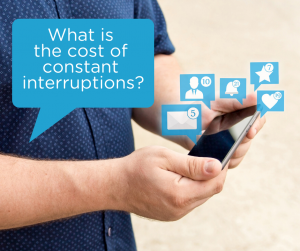
Here’s a challenge: Can you read this article from beginning to end without being distracted? And how will any distractions affect your ultimate understanding of the subject? The answers might surprise you.
We tend to think that distractions are a normal part of life, but it’s often a valuable exercise to take a step back and consider the impact of constant interruptions. Why is this important? Like most people, you have a lot to accomplish every day. You also have goals you want to reach. Perhaps you want to work towards greater health, making a bigger impact with the work you do or improve your relationships. And not being able to focus can impact your ability to reach those goals.
The Hidden Cost of Distraction
Interestingly, many people argue that they are more efficient when they are busy and multi-tasking. And in fact, researchers have found that we do actually work faster when we’re faced with a lot of distractions. That may be because we subconsciously feel that we have to overcompensate for the interruptions.
Higher Anxiety
However, studies have also found that the cost of distractions affects something far more important than your productivity: your wellbeing. That’s because distractions make you feel more stressed and anxious. And higher levels of anxiety can affect every part of your body.
Lower Accuracy
As well, being distracted can affect your accuracy. It makes sense: Your brain can only handle so much input at a time. However, what is surprising is how little it takes to derail your focus and affect your accuracy. As little as three seconds of distraction (the time it takes to glance at your phone after it beeps) can affect your focus and, in turn, your accuracy.
Distraction Recovery Time
The effects of even short distractions like that are startling. One study found that it takes an astounding 23 minutes and 15 seconds to regain your focus after an interruption. Let’s put that in perspective for a moment. How often does your phone ring or beep while you’re doing something else? If it takes over 20 minutes to recover from every notification, how much of your day is spent in “distraction recovery”? And does the loss of that time affect your long-term health and your goals?
Altered Memory Function
Consider what happens when you are looking things up while you watch a movie. Do you really follow the plot as carefully? Do you remember the details of the movie as well? Science suggests that you don’t. In fact, researchers have found that the way we remember things has changed since the advent of the Internet. Our memory functions have been altered.
How To Prevent Distractions
If you would like to minimize the impact of distractions in your life, it’s important to recognize the distinction between a needed break and a distraction. A break can be a good time to recharge and clear your mind. We’re typically more productive after we have stepped away from work for a bit. Breaks that are planned usually provide an incentive to work hard. In contrast, a distraction can come out of nowhere.
Although we tend to think of distractions as out of our control, we can take steps to reduce them.
1. Take Control Of Your Devices
Yes, we all rely on our phones - but do we really need to be notified every single time something happens? This is a personal preference and will depend on your situation, but it helps to be aware that you can customize your phone’s notifications. For example, parents are often reluctant to turn their phones off in case their kids need them, but you can adjust your settings so that all but a few specific contacts are muted.
It’s ok to let people know that, starting now, you may not respond right away to email or text messages. If you get a lot of emails at work, a good habit is to set aside specific times for checking your email, for example once every two hours or in the morning and at the end of the day.
2. Turn Off Your Notifications
It might feel like an adjustment at first to do away with the little red dot that tells you how much has been happening on Facebook, Twitter or in the news, but you’ll soon realize that you don’t miss anything important. You simply gain more control over when and where you get information. (It might help to remember that the ultimate goal of the apps on your device isn’t to keep you informed - it’s to make money by grabbing your attention.)
3. Schedule Your Breaks
It’s important to take a break when focused on a lengthy task. You’re less likely to be distracted and stay on task if you schedule a bit of time to relax - see it as a reward if that helps. Regular breaks can actually make you more productive! However, those breaks should be mindful ones, not filled with more things begging for your attention. So take a walk, meditate, or even have a quick nap. The important thing is to clear your mind.
4. Train Yourself To Regain Focus
Now that you understand how long it can take to regain your focus after each distraction, make a conscious effort to get back on task faster!
Does The Way You Live Your Life Make It Harder To Pay Attention When It Matters?
It’s also important to look at how aspects of your lifestyle can affect your focus. If you’re rested and healthy, distractions may not impact you as much as they would otherwise.
Simple adjustments like introducing a 10-minute-a-day meditation practice, or going to bed 30 minutes earlier, can positively impact your ability to focus and improve your response to interruptions.
Outside Influences That Can Affect Your Focus
If you have tried all the tricks and still find it difficult to stay on task it might be a good idea to check in on your health. Many imbalances such as thyroid problems, hormonal imbalances and nutrient deficiencies can lead to “foggy thinking” and slow response times. The good news is, we can help you to uncover these issues with a proper health assessment that includes lab tests.
How are distractions affecting your health? It’s something to think about. if you have been making efforts but still find it harder to focus than before - brain fog, forgetfulness, there could be more factors at play so give us a call!
References:
https://www.ics.uci.edu/~gmark/chi08-mark.pdf
http://www.yalescientific.org/2013/05/is-google-ruining-your-memory-the-science-of-memory-in-the-digital-age/
https://www.scientificamerican.com/article/mental-downtime/


